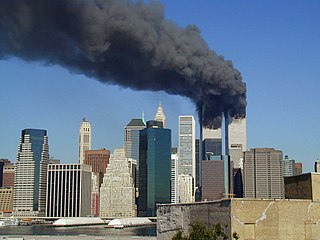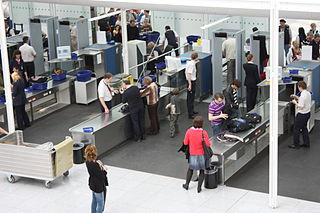
United Nations Security Council Resolution 1373, adopted unanimously on 28 September 2001, is a counterterrorism measure passed following the 11 September terrorist attacks on the United States. The resolution was adopted under Chapter VII of the United Nations Charter, and is therefore binding on all UN member states.

United Nations Security Council resolution 1566, adopted unanimously on 8 October 2004, after reaffirming resolutions 1267 (1999), 1373 (2001) and 1540 (2004), the Council condemned terrorism as a serious threat to peace and strengthened anti-terrorism legislation.
The ISIL (Da'esh) and Al-Qaida Sanctions Committee is a committee of the United Nations Security Council tasked with implementing international sanctions against the Islamic State and al-Qaeda. It was established as the Al-Qaida and Taliban Sanctions Committee on 15 October 1999, pursuant to Security Council Resolution 1267, which designated al-Qaeda and the Taliban as terrorist organizations. Following the creation of a separate Taliban Sanctions Committee on 17 June 2011, it was renamed the Al-Qaida Sanctions Committee. The scope of the sanctions regime was expanded to include the Islamic State on 17 December 2015 pursuant to Resolution 2253.
The Counter-Terrorism Committee is a subsidiary body of the United Nations Security Council.
United Nations Security Council Resolution 1790 was adopted unanimously by the United Nations Security Council on December 18, 2007, extending the mandate of the multinational force in Iraq until December 31, 2008. The mandate had been established in 2004 by Security Council resolution 1546 and previously extended by resolutions 1637 and 1723.

United Nations Security Council resolution 1540 was adopted unanimously on 28 April 2004 regarding the non-proliferation of weapons of mass destruction. The resolution establishes the obligations under Chapter VII of the United Nations Charter for all member states to develop and enforce appropriate legal and regulatory measures against the proliferation of chemical, biological, radiological, and nuclear weapons and their means of delivery, in particular, to prevent the spread of weapons of mass destruction to non-state actors.

United Nations Security Council Resolution 1637, adopted unanimously on 8 November 2005, after reaffirming previous resolutions on Iraq, the Council extended the mandate of the multinational force until the end of 2006.
United Nations Security Council Resolution 1377 was adopted unanimously at a ministerial meeting on 12 November 2001; the Council adopted a declaration concerning efforts to eliminate international terrorism.
United Nations Security Council resolution 1526, adopted unanimously on 30 January 2004, after recalling resolutions 1267 (1999), 1333 (2000), 1363 (2001), 1373 (2001), 1390 (2001), 1452 (2002) and 1455 (2003) concerning terrorism, the council tightened sanctions against Al-Qaeda, the Taliban, Osama bin Laden and associated individuals and groups.
United Nations Security Council resolution 1535, adopted unanimously on 26 March 2004, after reaffirming resolutions 1373 (2001), 1377 (2001) and 1456 (2003), the council restructured the Counter-Terrorism Committee to enhance the implementation of anti-terrorism measures.

United Nations Security Council Resolution 1963, adopted unanimously on December 20, 2010, after reaffirming resolutions 1373 (2001), 1535 (2004), 1624 (2004), 1787 (2007) and 1805 (2008), the Council decided to continue the Counter-Terrorism Committee Executive Directorate (CTED) under the guidance of the Counter-Terrorism Committee (CTC) for another three years until December 31, 2013.

United Nations Security Council resolution 1617, adopted unanimously on 29 July 2005, after recalling resolutions 1267 (1999), 1333 (2000), 1363 (2001), 1373 (2001), 1390 (2001), 1452 (2002), 1455 (2003), 1526 (2004) and 1566 (2004) concerning terrorism, the Council renewed sanctions against Al-Qaeda, the Taliban, Osama bin Laden and associated individuals and groups for a further seventeen months.

United Nations Security Council resolution 1624, adopted unanimously at the 2005 World Summit on 14 September 2005, after reaffirming previous resolutions on terrorism, including resolutions 1267 (1999), 1373 (2001), 1535 (2004), 1540 (2004), 1566 (2004) and 1617 (2005), the Council called on all states to co-operate in order to strengthen the security of their international borders by enhancing terrorist screening and passenger security procedures.

United Nations Security Council Resolution 1662, adopted unanimously on March 23, 2006, after reaffirming all resolutions on the situation in Afghanistan, including resolutions 1589 (2005) and 1659 (2006), the Council extended the mandate of the United Nations Assistance Mission in Afghanistan (UNAMA) for an additional period of twelve months.
United Nations Security Council Resolution 1787 was unanimously adopted on 10 December 2007.
United Nations Security Council Resolution 1805 was unanimously adopted on 20 March 2008.

The Office of the Special Representative of the Secretary-General on Sexual Violence in Conflict (OSRSG-SVC) is an office of the United Nations Secretariat tasked with serving the United Nations' spokesperson and political advocate on conflict-related sexual violence, the Special Representative of the Secretary-General on Sexual Violence in Conflict (SRSG-SVC). The Special Representative holds the rank of Under-Secretary-General of the UN and chairs the UN Action Against Sexual Violence in Conflict. The mandate of the SRSG-SVC was established by Security Council Resolution 1888, introduced by Hillary Clinton, and the first Special Representative, Margot Wallström, took office in 2010. The current Special Representative is Pramila Patten of Mauritius, who was appointed by UN Secretary General António Guterres in 2017. The work of the SRSG-SVC is supported by the UN Team of Experts on the Rule of Law/Sexual Violence in Conflict, co-led by the Department of Peacekeeping Operations (DPO), Office of the High Commissioner for Human Rights (OHCHR) and the UN Development Programme (UNDP), also established under Security Council Resolution 1888.
United Nations Security Council Resolution 2650 was passed by a unanimous vote on 31 August 2022, which extended through 31 August 2023 the United Nations Interim Force in Lebanon. This was done so at the request of the third Cabinet of Najib Mikati as the current Government of Lebanon.








